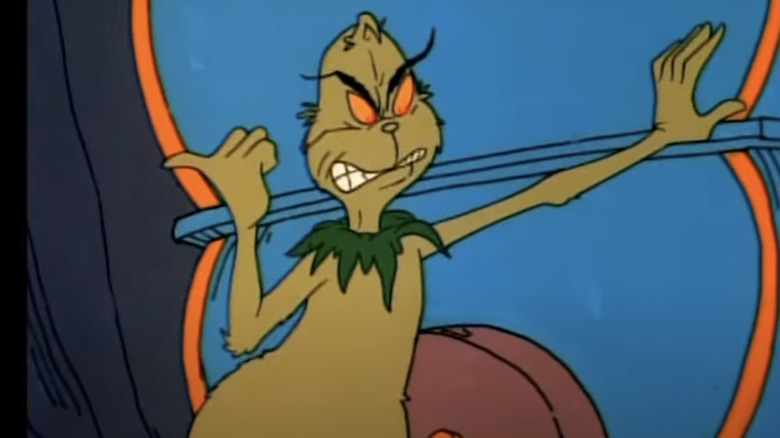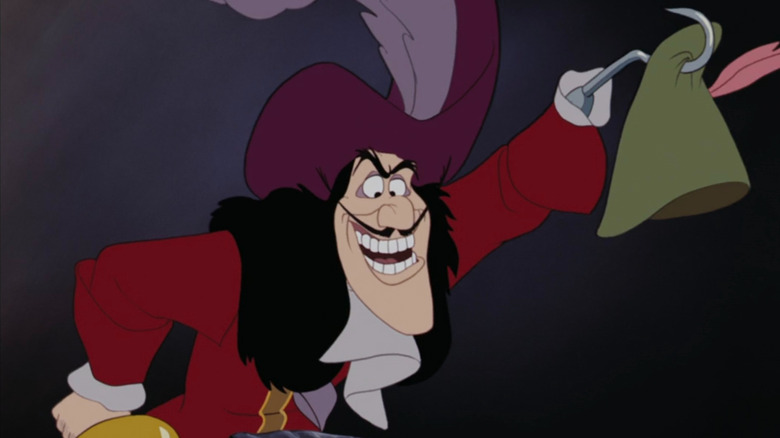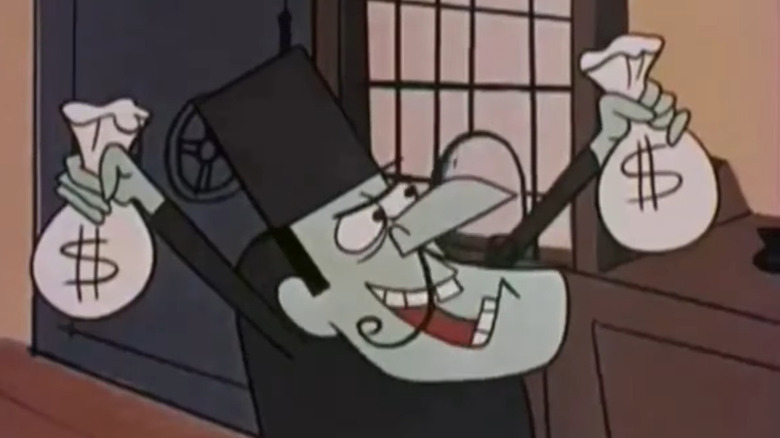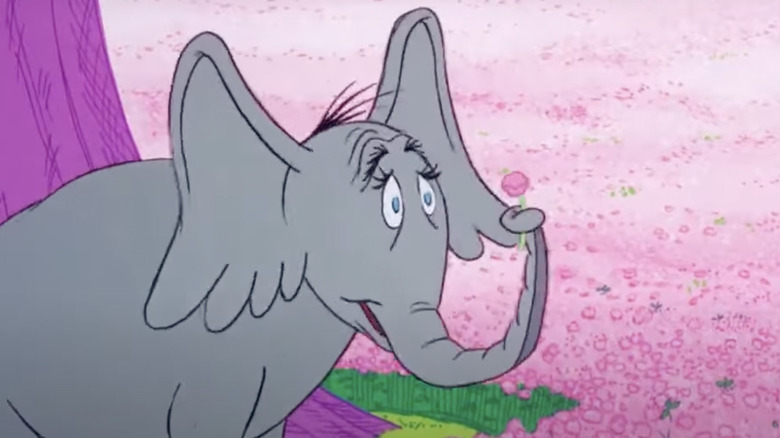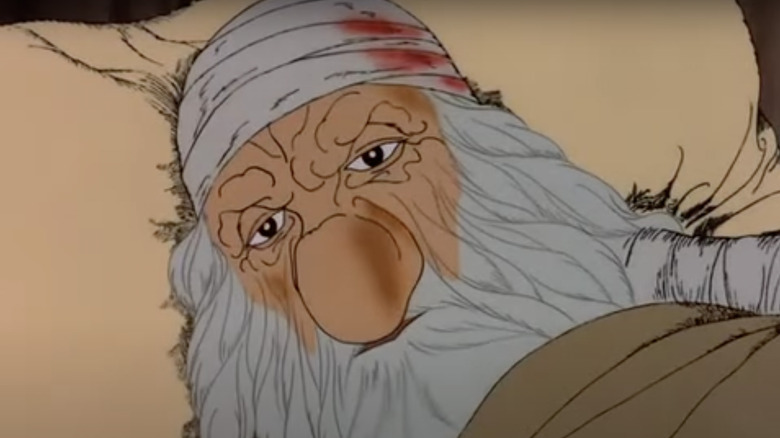Why The Grinch Sounds Different - And Familiar - In Halloween Is Grinch Night
Out of the many interpretations of Dr. Seuss' iconic holiday miser, the Grinch, one version that doesn't get much mention is the character's appearance in the 1977 television special "Halloween Is Grinch Night." Those who have seen it may think something is off about his voice compared to the way he sounds in "How the Grinch Stole Christmas!," and they'd be right.
The Emmy-winning special sees the Grinch descend from his mountain home on Halloween to cause trouble in Whoville, but one brave young Who gets in his way. One glance at the prequel "Halloween Is Grinch Night" makes it obvious that this is of a different pedigree from the 1966 Christmas special that has since become required holiday viewing. Along with its psychedelic animation and downbeat songs, the Grinch himself received a drastic makeover, both in design and voice.
For the latter, since the original Grinch voice actor Boris Karloff had passed away in 1969, the role was handed off to actor Hans Conried, who also acts as the film's narrator. While it's tough to top Karloff's performance, Conried gives it his all in making the Grinch as delightfully despicable as ever. And some little digging into Conried's filmography reveals what made him such a fitting choice.
Peter Pan (1953)
Hans Conried's most memorable performance – Captain Hook from 1953's "Peter Pan" — arguably makes the character among the best Disney villains to date. The film retells the classic tale based on the 1904 J. M. Barrie play "Peter Pan, or the Boy Who Wouldn't Grow Up" which sees the eternally youthful Peter Pan transport the Darling siblings to the magical realm of Neverland where they hope to stay and also never grow up. Along the way, they encounter a variety of dangers, most prominently the villainous Captain Hook and his band of pirates.
It's not hard to see how Hook earned his place as a top-tier Disney adversary once you see him in action. The blind rage and hatred he has for Peter Pan knows no bounds and contrasts with Peter's happy-go-lucky playful nature, making their rivalry feel larger-than-life. But Hook's threatening nature disappears on the turn of a dime when the infamous tick-tocking crocodile — who ate Hook's hand and now seeks to finish the rest of the pirate captain off — is anywhere near his vicinity. Conried strikes the perfect balance through his vocal performance, making Hook imposing, witty, and cowardly all at once.
Keeping in line with the traditions of the original play, Conried pulled double duty on "Peter Pan" by also voicing Mr. Darling. It wouldn't be his last bout with the House of Mouse. Between 1955 and 1979, Conried played several roles in "The Magical World of Disney" TV show. For 1959's "Sleeping Beauty," he provided the voice of the minor character Lord Duke and served as a live-action reference for King Stefan.
Dudley Do-Right of the Mounties (1959-1963)
You don't get much more villainous than with a black cloak, evil laugh, and handlebar mustache just begging to be twisted. Checking all these boxes is another classic Hans Conried voice role with Snidely Whiplash, who serves as the antagonist in the "Dudley Do-Right of the Mounties" segments of the classic Jay Ward cartoon "The Rocky and Bullwinkle Show."
With a design reminiscent of silent movie and stage villains, Whiplash is as stock a bad guy as you can get. Here, you'll find no deep motives to explain away his evildoing other than his pure enjoyment of it, but that's why we love him. Just as Dudley Do-Right makes for a simple-minded heroic figure, Whiplash acts as his nefarious equal with a knack for tying Do-Right's love interest, Nell Fenwick, to the train tracks.
What Whiplash lacks in depth is more than made up in his big, boastful personality, in large part thanks to Conried's spirited voice performance. His playful, tongue-in-cheek approach to the character not only aided in Snidely Whiplash becoming a textbook cartoon villain but also helped the show further achieve its self-aware tone, which was way ahead of its time.
Horton Hears A Who! (1970)
Long before taking on the titular grump of "Halloween Is Grinch Night," Hans Conried established himself as a regular in bringing Dr. Seuss characters to the screen. Perhaps his most well-known Seuss role is that of the lovable elephant in the 1970 "Horton Hears a Who!" animated TV special. Helmed by "How the Grinch Stole Christmas!" director Chuck Jones, the story retells the beloved story of a kind-hearted pachyderm who does everything in his power to preserve the microscopic world of Whoville that resides on a flower.
For those only familiar with Conried's villainous roles, his part as Horton, as well as the film's narrator and Who scientist Dr. Harold Hoovey, offers a refreshing change of pace. Horton's naive and innocent personality makes him instantly endearing and you root for him all the way through. Conried toned down the usual bombast quite a bit, but his more tender approach remained ever-effective.
In between "Horton Hears a Who" and "Halloween Is Grinch Night," Conried narrated 1973's "Dr. Seuss on the Loose," which presented three animated adaptations of other classic Seuss stories such as "Green Eggs and Ham" and "The Sneetches and Other Stories." The special saw Conried work alongside another Grinch voice actor, Bob Holt, who voiced the character in 1982's "The Grinch Grinches the Cat in the Hat."
The Hobbit (1977)
In the same year that Hans Conried voiced the Grinch in "Halloween Is Grinch Night," he also starred in another cult TV classic with the 1977 Rankin/Bass special "The Hobbit." Acting as the first film adaptation of the high fantasy J. R. R. Tolkien novel of the same name, the special chronicles the quest of Hobbit Bilbo Baggins and his newfound band of allies to take back the treasure stolen by the evil dragon Smaug.
The special sees Conried star as the vengeful dwarf Thorin Oakenshield. Seeking to reclaim Lonely Mountain and its treasure, he recruits Bilbo for the perilous mission. However, while Oakenshield proves an effective leader, he also possesses a selfish side. Oakenshield denies the hard-working team any share of the riches, believing it to be the rightful property of the dwarves. This births the war that ultimately proves to be the character's undoing. Despite his selfish act, he draws some sympathy toward the end of his life as he apologizes to Bilbo for this regretful behavior.
As can be imagined, Conried balanced all of these differing traits with ease, crafting a character who is honorable, even if it does come to a fault.
